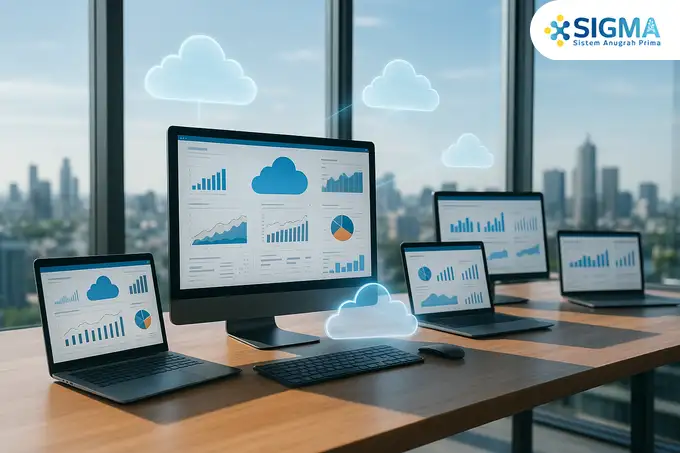In an era of rapid digital transformation, adopting cloud computing is no longer a mere option but a fundamental necessity for businesses striving to endure and excel. Organizations of all sizes, from small enterprises to global corporations, are compelled to operate with greater agility, efficiency, and responsiveness to shifting market demands. It is in this landscape that SAP Cloud ERP emerges as a vital solution, meeting these challenges head-on.
SAP Cloud ERP is an advanced cloud-based enterprise resource planning system that delivers indispensable advantages—ranging from operational cost savings and limitless scalability to continuous innovation and enterprise-grade data security.
By migrating ERP infrastructure to the cloud, companies can devote their focus to core business growth rather than the complexities of managing traditional IT systems.
This article will delve deeply into the manifold benefits of SAP Cloud for business, why it represents a strategic investment, and how PT. Sistem Anugrah Prima (SIGMA) can become your trusted partner on this transformative journey.
Why Are More Businesses Turning to SAP Cloud ERP?
The global trend toward cloud adoption continues to accelerate. Research from Gartner and Forrester consistently projects rapid growth in the cloud ERP market. This momentum stems from the inherent limitations of traditional on-premise ERP systems, such as:
- Exorbitant Upfront Costs (CAPEX): Requiring massive initial investments in servers, licenses, networking infrastructure, and data centers.
- Restricted Access: Difficult to use remotely, hindering mobility and the productivity of distributed teams.
- Complex and Costly Maintenance: Demanding dedicated IT staff to perform routine updates, troubleshooting, and system upkeep.
- Rigid Scalability: Expanding or reducing capacity is cumbersome, costly, and often necessitates new hardware investments.
SAP Cloud ERP transcends these limitations, offering a model that is more agile, cost-efficient, and future-ready.
Substantial Operational Cost Efficiency

One of the most compelling reasons to choose SAP Cloud is its remarkable potential for cost reduction. The key distinction lies in the shift from Capital Expenditure (CAPEX) to Operational Expenditure (OPEX).
- CAPEX Model (On-Premise): You purchase and own physical assets, locking significant upfront capital into depreciating resources.
- OPEX Model (Cloud): You subscribe to services, incurring predictable operational costs that can be aligned with monthly or annual budgets.
Concrete examples of cost savings with SAP Cloud:
- No Physical Server Costs: Eliminate expenses for purchasing, housing, cooling, and securing servers.
- Lean, Focused IT Teams: Free your IT staff from server maintenance to concentrate on strategic initiatives that drive innovation.
- Subscription Model: Predictable, transparent expenses—pay only for the users and features you require, without hidden costs for upgrades or maintenance.
Limitless Scalability & Flexibility
The business environment is dynamic. Today you may have ten users, but next year you might expand to two new branches requiring fifty. This is where the scalability of cloud-based ERP truly shines.
With SAP Cloud, adding users, enabling new modules (e.g., extending from Finance to Supply Chain Management), or increasing storage can be accomplished swiftly—often within hours.
This capability fully supports both domestic expansion (multi-branch) and international growth (multi-country), without the burden of costly infrastructure overhauls.
Moreover, the flexibility of SAP Cloud ERP empowers teams to work anytime, anywhere. With just an internet connection, the system is accessible via desktops, laptops, tablets, or smartphones—even for sales teams in the field.
Continuous Innovation & Automatic Updates
In on-premise systems, upgrades are often daunting projects: time-consuming, risky, and costly in consulting fees.
SAP Cloud redefines this paradigm. Updates, security patches, and new feature releases are automatically deployed by SAP without disrupting operations. This ensures perpetual access to the latest technology, including:
- Artificial Intelligence & Machine Learning: Automating processes and enabling predictive analytics.
- Advanced Analytics: Delivering real-time, data-driven insights into business performance.
- Cutting-Edge Security Features: Protecting data against ever-evolving cyber threats.
Boosted Productivity & Team Mobility
Real-time data access through a centralized platform is the foundation of effective collaboration. SAP Cloud enables every department—finance, sales, warehousing, and production—to operate from a unified, accurate dataset.
Picture this scenario:
- A field sales representative secures a new order and immediately records it via smartphone.
- The warehouse receives instant notification to prepare the goods.
- The finance team promptly forecasts revenue and issues the invoice.
Such seamless integration eliminates data silos, reduces duplication, and accelerates the entire business cycle—empowering employees with timely information and enhancing productivity.
Global-Standard Security & Compliance

Concerns about cloud security persist, yet leading providers like SAP invest far more resources into safeguarding data than most companies could manage on their own.
SAP Cloud’s security advantages include:
- Data Encryption: Comprehensive encryption both in transit and at rest.
- Multi-Layer Protection: Data centers fortified with top-tier physical and digital security, monitored 24/7.
- Global Certifications: Compliance with stringent international standards such as ISO 27001, GDPR, and industry-specific regulations.
- Automated Disaster Recovery & Backup: Routine backups across multiple geographic regions to ensure business continuity in the face of disruptions.
Direct Comparison: SAP Cloud vs. On-Premise
To provide a clearer perspective, let us compare both approaches in the following table.
| Aspect | SAP Cloud (Subscription-Based) | On-Premise (Self-Owned) |
|---|---|---|
| Initial Cost | Low (OPEX model) | Very High (CAPEX model) |
| Scalability | Extremely Easy & Fast | Difficult, Costly & Slow |
| Maintenance & Updates | Automated by Provider | Responsibility of Internal IT Team |
| Accessibility | Flexible (anywhere, anytime) | Limited (typically within the office network) |
| Implementation | Fast (within weeks/months) | Lengthy (within months/years) |
| Security | Managed by Experts & Globally Certified | Dependent on Internal Team Capabilities |
| Business Focus | On Growth & Innovation | On Maintaining IT Infrastructure |
Case Studies: Business Transformation in Indonesia
For SMEs (Distribution):
A mid-sized consumer goods distributor in Indonesia struggled to manage inventory across three warehouses. Delayed sales reports led to inaccurate purchasing decisions.
After adopting SAP Business One Cloud, they gained real-time inventory visibility across all sites, automated order processing, and accelerated financial reporting by up to 50%.
For Enterprises (Manufacturing):
A large manufacturing company with multiple plants faced challenges integrating production and financial data, hindering precise cost calculations. By implementing SAP S/4HANA Cloud, they unified all operational data on a single platform.
The result: a 20% boost in production efficiency and more accurate product costing to support competitive pricing strategies.
FAQ – Frequently Asked Questions About SAP Cloud
1. Is SAP Cloud designed solely for large enterprises?
No. SAP has developed tailored cloud solutions for businesses of all sizes, including SAP Cloud for SMEs such as SAP Business One Cloud. Its flexible subscription model ensures affordability for small and mid-sized enterprises.
2. Is SAP Cloud more cost-effective than on-premise systems in the long term?
Yes. When evaluating the Total Cost of Ownership (TCO), SAP Cloud almost always delivers savings. Though subscription fees are ongoing, you avoid costly and unexpected expenditures such as server replacements, license upgrades, and expanding IT staff.
3. How secure is my corporate data when stored in the cloud?
SAP deploys state-of-the-art cybersecurity protocols. Your data is safeguarded in secure data centers—both physically and digitally—subject to regular audits, and managed by global security specialists. Its security standards often exceed what internal IT teams can realistically provide.
Conclusion: The Future of Your Business Is in the Cloud
The benefits of SAP Cloud are not speculative—they are strategic imperatives. From extraordinary cost efficiency through OPEX, to scalability and flexibility that empower boundless growth, and cutting-edge innovation and security—cloud ERP is the cornerstone for a resilient, competitive enterprise.
Do not let rigid legacy systems restrain your growth potential. Digital transformation is a journey, and its first critical step is to build upon a solid technological foundation.
Are you ready to propel your business efficiency and growth to the next level with SAP Cloud?
As an official SAP Gold Partner in Indonesia, PT. Sistem Anugrah Prima (SIGMA) offers proven expertise and experience to guide you in deploying the SAP Cloud ERP solution most suited to your unique requirements.
Contact the SIGMA Expert Team Today for a Complimentary Consultation!
Discover how SIGMA can serve as your trusted partner in digital transformation and unlock your business’s full potential.


